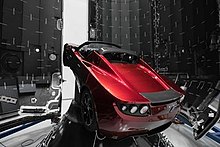Space is back! Well, back in the news, that is. A spectacular launch (and 2/3 landing) of the SpaceX‘s latest and so far the most advanced system, the Falcon Heavy, was broadcast around the world with an amazing speed and determination. News items heralded a beginning of a new era and some (over)excited reporting even looked upon it as a revival of the Apollo era excitement for Space, helped by the fact it launched from the same launchpad at Kennedy Space Centre as Apollo 11, with one of the first Moon-walkers looking on.
The amazing technical achievement is, of course, a great reason for celebration. Sticking three rockets together and make them work as one is a no mean feat. Getting them back to Earth and landing two of them simultaneously is also awe inspiring, and should, I believe, be shown with a backdrop of classical music, preferably something from the Swan Lake. This picture will, I think, in time become the iconic image marking this transformational moment in human’s space exploration. (And the fact that the core rocket did not quite manage to land on a barge in the middle of an ocean, is really but an insubstantial footnote.)
But then we get to the car… specifically the Elon Musk’s red Tesla Roadster (here pictured in the space payload fitting):

Now, I like the principle behind Tesla (the company) a lot, and the world certainly needs more capable batteries and many more electric cars, though much like SpaceX (over)reliance on public procurement orders, Tesla is still by and large unprofitable and enjoying quite a decent bit of what is called “state aid” everywhere, but in the US. However, launching one of Tesla’s creations into the Outer Space is the exact opposite to the go-green agenda or even good business sense.
I don’t buy into the narrative that this is just a bit of PR for Tesla as, with key limiting factors being slow production and sky-high price tag, I don’t quite envisage a rush for Roadsters materialising in the next few weeks. And even if it does, the un/intended consequences of this payload deployment are far more worrying than just wasting a perfectly good car and $90m on an advertising stunt.
On top of some decent critical analysis, such as Nathan Robinson’s piece in the Observer , noting the emptiness of such move as an investment to “change the world” and Marina Koren’s solid analysis of just what a break from the past universalism in Outer Space exploration this development is, there are two other critical issues, not getting quite as much attention:
Firstly, the environmental impact. Whilst Falcon Heavy’s re-usability (at a reasonably low cost) is a big win for the traditionally wasteful space launch capabilities, its reliance on fossil fuels (in a some contrast to another billionaire’s project, Blue Origin, experimenting with liquid hydrogen), is not to be celebrated. Even more worryingly, though payload (the car) itself will not pollute the low-earth-orbit (one of the most challenging issues for modern space industry is precisely the amount of objects already circling around the Earth, potentially blocking access to Space), sending such purposeless object in Space sends the wrong kind of message as to the attitude industry and public should adopt towards “space junk”.
Secondly, there is a more subtle, though on the long run perhaps an even more important issue – the message it sends as to what humanity’s intentions in space are and who is doing it. As Koren noted in her piece in the Atlantic, geopolitics aside, space race was actually quite considerate in its feats; today, that rule-book has been thrown out of the window. Moreover, this has ostensibly been done to “please” “the geeks” (note references to Hitchhikers Guide to the Galaxy, blasting out Bowie’s Space Oddity, planting circuit boards with secret messages, etc.) – the up and coming engineers, developers and entrepreneurs, who having had a hard time in the US’ sports-obsessed educational system, believe the ultimate realisation of their dreams and aspirations might now lay in working for Elon Musk.
As such, it becomes apparent that Musk’s PR stunt’s audience is the “New Space” workforce, not his automotive customers. By exposing SpaceX as a “fun” geeky paradise and himself as an unashamed geek, as “one of us”, he can in one move placate the overworked and exploited workforce, instilling in them that they are doing something meaningful, as well as on the other hand, exploit that very same culture to justify a free pass to do whatever he wants in Outer Space.
Here is the sticking point – though the now iconic red Roadster might have become the Falcon Heavy’s first payload, because it is a “replaceable loss”, it was then carefully and masterfully transformed as a cultural reference point to legitimise and enshrine SpaceX and its ethics as the new norm in Space Exploration and Industry. It is meant to be a holy shrine of progress to the growing mass of young people, whose work-life balance is to be routinely sacrificed on the altar of “cool tech”, and all for substantial, taxpayer subsidised ego-boosts for the few on top. And that is very worrying indeed.

